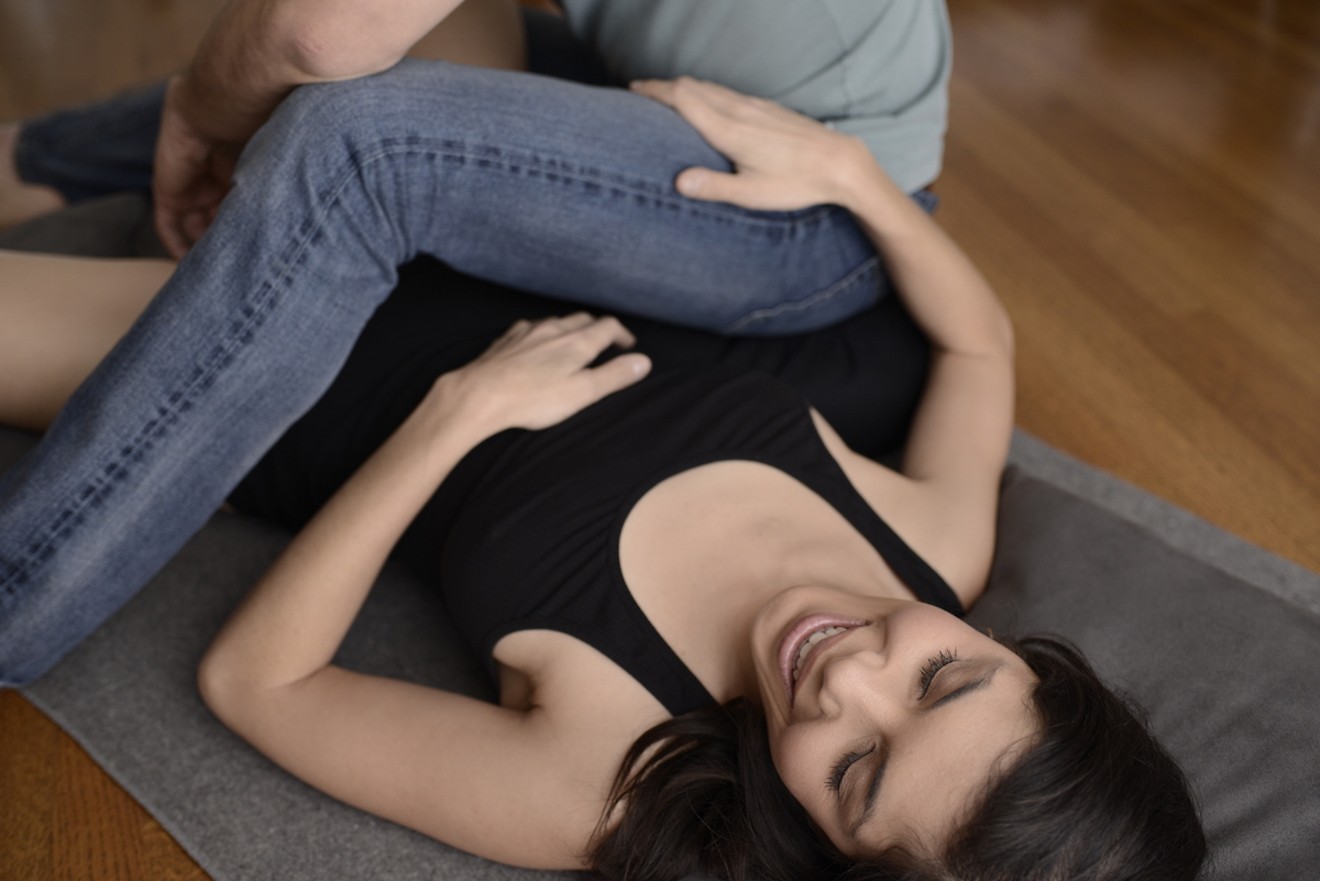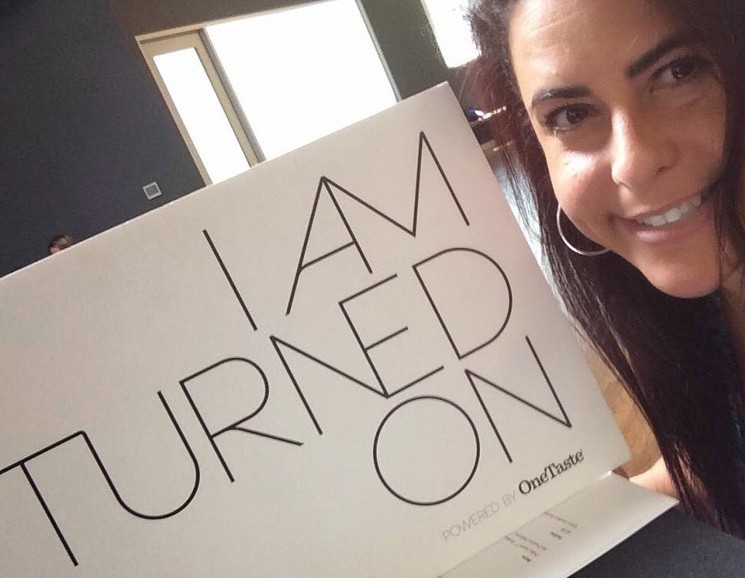“The more we do it, the more awake we become.”
That's how Sandra Lopez describes the benefits of the slow-sex practice she advocates. Lopez, a sexuality and relationships coach who discovered the slow-sex practice in 2013, is now a leader in South Florida’s orgasmic meditation (OM) community. Despite the "orgasmic" term and the fact that OM sessions might sound like low-key orgies to newcomers, she makes one thing clear: “It’s sexual, but it’s not sex.”
Lopez runs a bimonthly program called TurnOn South Florida in Palm Beach County where she introduces the concept of OM to new students. “I teach orgasm and not climax,” she explains.
In the OM practice, a woman lies on a mat naked from the waist down, legs butterflied out. A fully clothed man strokes the upper left quadrant of her clitoris for 15 minutes under a strict code of conduct, with etiquette rules, safe words, and respect. The OM practice usually takes place in an OM circle, alongside other participants, although a couple can do it privately at home. Though the original OneTaste philosophy focuses on female orgasm, there are now stroking practices for all genders.
“He’s stroking the clitoris without a goal,” Lopez explains. “You’re going to allow yourself to feel and see what’s going on in your body.”
Lopez first learned about the OM practice while cohosting a weekly Social Chats South Florida podcast about health and wellness with Tonya Scholz. They’d been talking a lot about oxytocin, the feel-good, love hormone, and their guest was a gynecologist who discussed orgasmic meditation as a treatment option for patients suffering from sexual trauma. Lopez became intrigued. Her curiosity led her to an OM conference in San Francisco, follow-up classes in New York City, and a ten-month coaching program in California.
For Lopez, the journey of discovering a deeper power in orgasm has been life-changing. Today she harnesses and incorporates it into a healthy physical and spiritual lifestyle. “Having been in a divorce, I started to build this wall and couldn’t have functional relationships with men,” she says. “I was searching for a better way to connect with men, something deeper, something more than just a sexual relationship.”
The OM practice is based on founder Nicole Daedone’s seminal and revolutionary approach to female orgasm, which she launched as a program called OneTaste in 2004. Orgasmic meditation helps women connect their orgasms to a mindful state of being instead of just a typical, goal-oriented sexual release. In a 2011 TEDx talk, Daedone claimed it’s a cultural, not medical issue that prevents women from exploring their deeper selves through orgasm. According to Daedone, “turned-on” women — the namesake of Lopez’s OM meetup — have the capacity to change the world.
Lopez, who is in a relationship but has a regular, separate stroke partner and often practices with other strokers, says it’s not about sex but rather an exchange of energy and an opportunity for a woman to pay attention, surrender, and reclaim the birthright of orgasm. “The more I practice, it’s easier for me to feel safe in my truth,” she says. “People will hide. They feel that they have control by being introverted and numbing themselves in the hurt. When you surrender and come out of control, you don’t need to hide. You feel safer. It touches a deeper side of you.”
Though participants don't consider OM a sexual act, it offers potential benefits for a more intimate, joyful, and meaningful sex life where, Lopez says, “is where women usually starve themselves the most.”
Lopez says the practice is also beneficial for men who really want to please women. “The clitoris is a mystery to them,” she says. “They don’t really know where to touch you. They come to learn how to connect with women in a way they’re not hurting you. It’s not pervy or porn at all.”
The experience is similar to Eastern traditions of tantra that stem from the desire to connect, but it takes a great deal of practice, focus, and concentration to achieve that connection. Orgasmic meditation means putting the phone down, being in the moment, and letting go of expectations.
“Men can come from a really beautiful sense of wanting to really know a woman,” Lopez says. “The experience of the energy exchange is amazing.”
Women have just as much to unlearn about traditional Western sex practices as men do, because no one really gets the manual on good orgasm at birth. The stroking process is an education and helps women to own their orgasm, become more attentive, and surrender to their own bodily sensations.
“Women tend to satisfy by stroking the male ego,” Lopez explains. “They fake orgasm to please a man. They don’t speak out and ask for what they want. This practice takes the shame out of the orgasm.”
Lopez has had requests to organize a TurnOn South Florida meetup in Miami, which she hopes to do to save sexually active Miamians the long drive. How could it make South Florida a better place? More mindful orgasms, simply put, translate into a better world.
“When we’re happier, more satisfied, we’re going to be a more united community. It’s really ultimately all about bringing community together,” Lopez says. “There’s a lot of word out there about South Florida being a rude place. There’d be a better flow if we were more connected.”
Visit TurnOn South Florida on Facebook and Meetup, or call Sandra Lopez at 561-758-7015.
[
{
"name": "Air - MediumRectangle - Inline Content - Mobile Display Size",
"component": "19274298",
"insertPoint": "2",
"requiredCountToDisplay": "2"
},{
"name": "Editor Picks",
"component": "17482312",
"insertPoint": "4",
"requiredCountToDisplay": "1"
},{
"name": "Inline Links",
"component": "18711090",
"insertPoint": "8th",
"startingPoint": 8,
"requiredCountToDisplay": "7",
"maxInsertions": 25
},{
"name": "Air - MediumRectangle - Combo - Inline Content",
"component": "17482310",
"insertPoint": "8th",
"startingPoint": 8,
"requiredCountToDisplay": "7",
"maxInsertions": 25
},{
"name": "Inline Links",
"component": "18711090",
"insertPoint": "8th",
"startingPoint": 12,
"requiredCountToDisplay": "11",
"maxInsertions": 25
},{
"name": "Air - Leaderboard Tower - Combo - Inline Content",
"component": "17482313",
"insertPoint": "8th",
"startingPoint": 12,
"requiredCountToDisplay": "11",
"maxInsertions": 25
}
]













